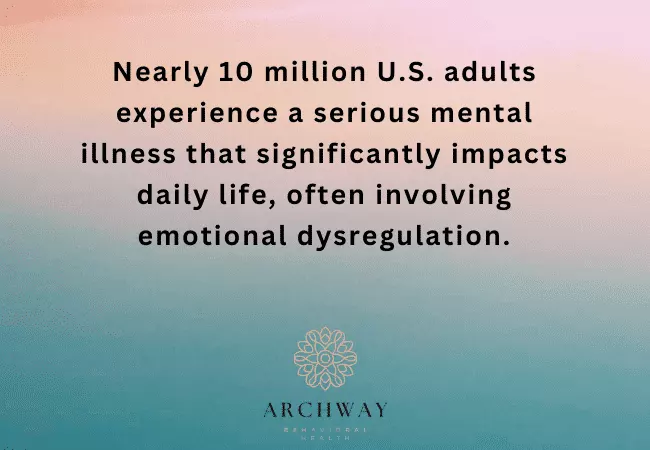We all experience intense emotions—but for some, emotions can feel overwhelming, unpredictable, and even dangerous. For individuals dealing with anxiety, depression, trauma, or personality disorders, emotional dysregulation can make everyday life feel chaotic and unmanageable.
Fortunately, there is a structured, evidence-based approach that can help people regain control: Dialectical Behavior Therapy (DBT). At Archway Behavioral Health, a trusted mental health treatment center in Florida, DBT is a cornerstone of our clinical approach. Whether you’re enrolled in our Partial Hospitalization Program (PHP) Florida, Intensive Outpatient Program (IOP) Florida, or receiving traditional outpatient therapy, DBT provides a powerful framework for emotional healing and personal growth.
What Is Dialectical Behavior Therapy (DBT)?
Dialectical Behavior Therapy is a specialized form of Cognitive Behavioral Therapy (CBT) originally developed by Dr. Marsha Linehan to treat Borderline Personality Disorder. Over time, DBT has proven effective for a wide range of mental health conditions—including anxiety, depression, PTSD, substance use disorders, and more.
The term “dialectical” means integrating two seemingly opposite ideas: acceptance and change. DBT teaches clients that they can accept themselves as they are while still working to build a life worth living.
At Archway, we incorporate DBT into our mental health treatment services Florida, offering practical tools for emotion regulation, interpersonal skills, and mindfulness.
The Four Pillars of DBT
DBT is built on four core modules, each targeting a key aspect of emotional and behavioral health:
1. Mindfulness
Mindfulness is about being fully present in the moment. It helps individuals become aware of their thoughts and emotions without immediately reacting to them.
- Enhances emotional clarity
- Reduces automatic responses
- Builds focus and presence
2. Distress Tolerance
This module teaches skills for surviving emotional crises without making the situation worse.
- Crisis survival strategies (e.g., grounding, distraction)
- Acceptance of painful realities
- Reducing reliance on self-harm or impulsive behavior
3. Emotion Regulation
These skills help clients identify emotional triggers, reduce vulnerability, and react to emotions in healthy ways.
- Identifying emotions accurately
- Increasing positive emotional experiences
- Reducing emotional intensity over time
4. Interpersonal Effectiveness
Healthy relationships are key to emotional stability. This module improves communication and boundary-setting.
- Assertive communication
- Saying “no” while preserving relationships
- Navigating conflict with self-respect
Conditions DBT Can Help Treat
At Archway Behavioral Health, our Dialectical Behavior Therapy Florida services support clients managing a range of conditions, including:
- Borderline Personality Disorder (BPD)
- Generalized Anxiety Disorder (GAD)
- Major Depression
- Bipolar Disorder
- Post-Traumatic Stress Disorder (PTSD)
- Eating Disorders
- Substance Use Disorders
- Self-Harming or Suicidal Behavior
- Emotional Dysregulation
We incorporate DBT across programs, including our Anxiety Treatment Program Florida and Depression Treatment Program Florida, to address emotional reactivity and help clients respond to stress more effectively.
How DBT Builds Resilience
Emotional resilience is the ability to navigate hardship, regulate reactions, and bounce back from adversity. DBT helps individuals build this resilience by:
- Increasing awareness of emotional patterns
- Providing real-time coping strategies
- Helping reframe unhelpful thought patterns
- Improving tolerance for discomfort
- Strengthening personal identity and values
By mastering these skills, clients learn not only how to survive difficult moments—but how to grow from them.
DBT and Trauma Recovery—A Powerful Combination
One of DBT’s most transformative applications is in the treatment of trauma-related disorders. Many people who have experienced emotional, physical, or sexual trauma develop patterns of hypervigilance, dissociation, emotional numbing, or impulsivity. DBT offers a uniquely structured, compassionate framework for managing trauma responses.
Why DBT Is Effective for Trauma Survivors:
- Trauma often disrupts the ability to regulate emotions—DBT directly addresses this.
- Survivors may experience black-and-white thinking or shame—DBT balances acceptance with change.
- Self-harming behaviors can be common in trauma survivors—DBT’s distress tolerance tools provide safer alternatives.
How We Use DBT for Trauma at Archway:
At Archway Behavioral Health, clients in our Partial Hospitalization Program Florida or Intensive Outpatient Program Florida may receive integrated DBT skills training alongside trauma-focused therapy (including CBT and somatic techniques). This dual approach helps clients:
- Stabilize emotional responses
- Build trust in themselves and others
- Reconnect with their identity beyond trauma
Whether trauma is recent or long-past, DBT creates a roadmap for healing with both structure and compassion.
DBT vs. CBT: Which One Is Right for You?
While both therapies are highly effective, DBT focuses more on emotional regulation and relational dynamics, while CBT targets negative thought patterns and behavior change.
| CBT | DBT |
|---|---|
| Ideal for anxiety, depression, phobias | Ideal for emotional intensity, impulsivity, trauma |
| Focuses on changing thoughts | Balances thought change with emotion acceptance |
| Often short-term | Typically longer-term, skill-based |
| Structured, goal-focused | Modular, skill-development focus |
At Archway, we offer both Cognitive Behavioral Therapy Florida and DBT, often combining elements from both based on each client’s unique presentation.
Our DBT-Informed Programs at Archway
Partial Hospitalization Program Florida (PHP)
Structured full-day treatment (5–6 hours/day), 5 days per week. DBT skills are taught in both group and individual therapy, with real-time application and support.
Intensive Outpatient Program Florida (IOP)
Flexible part-time program (3–5 days/week) designed to reinforce DBT skills while clients begin to re-engage with life outside of treatment.
Outpatient DBT Therapy
Ideal for long-term maintenance or clients stepping down from a higher level of care. Weekly sessions focus on continued skill building and emotional growth.
Why Choose Archway Behavioral Health?
As a leading mental health treatment center in Florida, Archway is committed to delivering personalized, evidence-based care in a safe and supportive environment.
Why clients choose us:
- Certified DBT providers and trauma-trained clinicians
- Customized care plans based on your unique goals and symptoms
- Full spectrum of care—from crisis stabilization to long-term recovery
- Integration of CBT, DBT, mindfulness, psychiatry, and wellness practices
- A stigma-free, empowering space where you’re treated with dignity and compassion
Conclusion
Struggling with your emotions doesn’t make you weak—it makes you human. But with the right support and tools, you can learn to manage your feelings, build healthy relationships, and respond to life’s challenges with confidence instead of fear.
Dialectical Behavior Therapy isn’t just about surviving tough emotions—it’s about learning how to live well, even when things feel hard.
At Archway Behavioral Health, we’ll meet you exactly where you are and help you build the skills to move forward. Whether you’re seeking healing from anxiety, trauma, or emotional burnout, our DBT-based programs are here to help. Call us today at (888) 488-4103 to speak with a care specialist. Together, let’s build the resilience you deserve—and the life you want. Healing begins here. Growth begins with you.
Frequently Asked Questions (FAQ)
What is Dialectical Behavior Therapy (DBT)?
DBT is a type of Cognitive Behavioral Therapy (CBT) that helps individuals regulate intense emotions, manage stress, and improve relationships. It focuses on balancing acceptance with change through skill-building modules.
Who benefits most from DBT?
DBT is highly effective for individuals with borderline personality disorder, trauma histories, emotional dysregulation, suicidal ideation, anxiety, and depression. It’s also beneficial for those who struggle with impulsive behaviors or unstable relationships.
How is DBT different from CBT?
While CBT focuses on changing negative thought patterns, DBT adds components of mindfulness, emotional regulation, and interpersonal effectiveness. DBT is especially suited for individuals who experience emotional intensity and need coping skills in daily life.
Is DBT part of Archway’s treatment programs?
Yes. DBT is a core component of our Partial Hospitalization Program Florida, Intensive Outpatient Program Florida, and outpatient services. It’s also integrated into our Anxiety and Depression Treatment Programs.
How long does DBT treatment last?
DBT is often longer-term than CBT. Many programs span 3 to 6 months or more, depending on the level of care and individual goals. At Archway, treatment length is personalized based on clinical needs and progress.
Can DBT be used for trauma recovery?
Absolutely. DBT is a powerful tool for trauma survivors, offering structure, emotional safety, and skills to manage triggers. At Archway, we often integrate DBT with trauma-informed care and other therapies for comprehensive healing.



